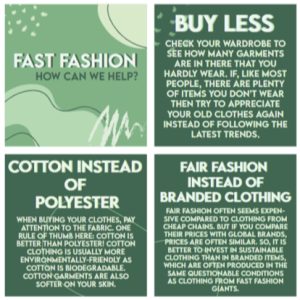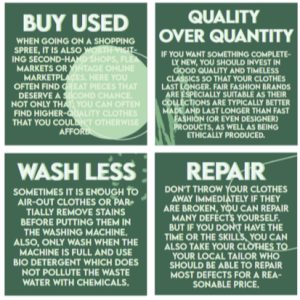The Sustainability Committee pledges to raise awareness of fast fashion and its environmental impact across the globe. In addition, those on the committee are learning about the human rights issues associated with fast fashion and working on possible solutions to which society can respond on both small and large scales.
Through educating the community about fast fashion, the Sustainability Committee aims to reduce the negative environmental impacts and draw attention to the life skills people can benefit from in learning about how they can make a difference.
The committee has provided the following seven tips for the community to consider when purchasing, recycling and reviving their clothing.
Buy Less
Rifle through your old clothes to see what can be worn, revamped or even up-cycled to fit your current style. Buying fewer clothes means that demand will decrease and, therefore, the production of these mass manufactured goods will decrease.
Buy Used
Second-hand shops can often have amazing clothes that deserve a second chance at great prices. This will also decrease the production of unethically sourced clothing and interrupt the cycle of clothing waste.
Quality over Quantity
Fast fashion is often lower quality than more durable and sustainable clothing. The production processes often involve systems that prioritise efficiency and speed over genuine craftsmanship. Investing in ethically-produced clothing makes for a more cost-effective decision in the long run.
Cotton
Polyester is made of plastic derived from fossil fuels whereas cotton is biodegradable and environmentally-friendly. Polyester also produces microplastics which, when the clothes are washed, pollute oceans and harm aquatic life.
Fair Fashion
The cost of more expensive clothing ensures the fair pay and adequate working conditions of the people who made the garments and the sourcing of relevant materials.
Wash Less
Using environmentally-friendly detergent and washing less, decreases energy usage and is, therefore, better for the environment. Washing more clothes together is a small act that can have substantial positive impacts.
Repair
Repairing your clothing is an essential skill that can save money and reduce waste. However, if you don’t have the time to learn, you can send the clothes to your local tailor to get them mended.
The committee is working on several initiatives and events to continue to raise awareness of the impacts of fast fashion on the environment. These include the clothes swap during Term 1 which promoted second-hand shopping and restyling old clothing, presenting about the mismanagement of the fast fashion industry at school assemblies, launching upcycling classes which teach essential repairing skills and ensuring the sustainability of Clarendon’s school uniforms.
Clarendon is proud of its Sustainability Committee which continues to raise awareness around significant, global issues and encourages change within our community.


